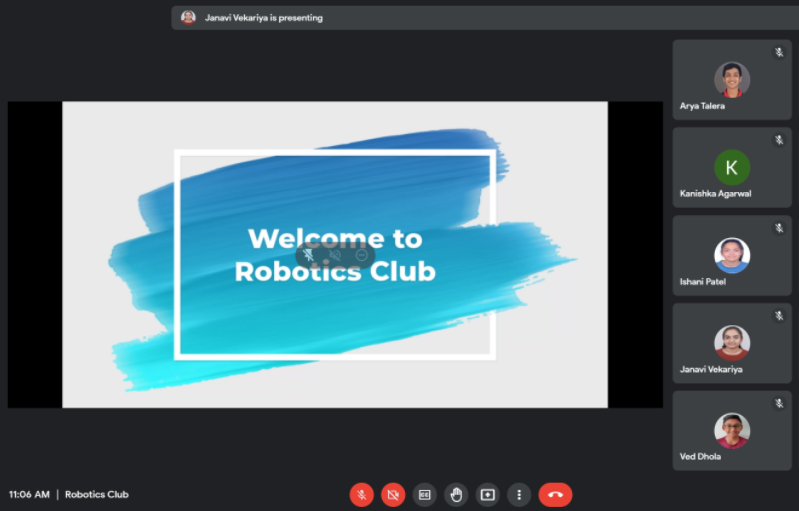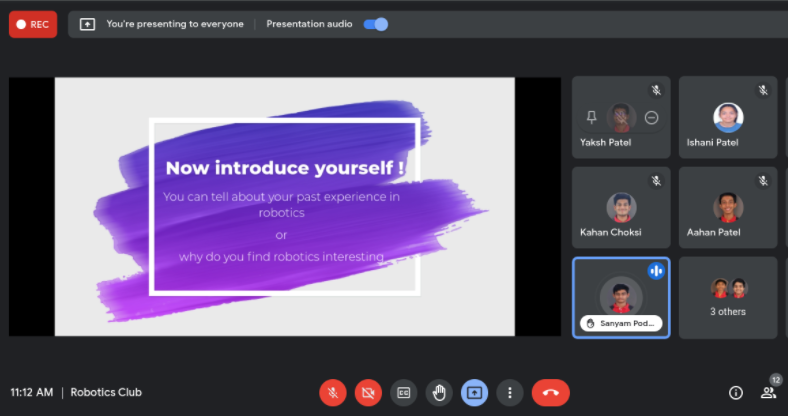(Creativity, Activity, Service)
I started robotics club as my cas project along with 3 of my friends, robotics is something which is a part of variety of fields like military, medical, entertainment, education,etc.We see that many people think that robotics is limited to humanoids, but in reality it is quite more than that. There are many people in our school who are interested in robotics, so we tried to provide a platform to collaboratively learn about robotics we also tried to understand what robotics really is through discussions on topics like robotics in various field, the recent discoveries in field of robotics,etc. My main motivation for starting this club with my friends was to encourage younger children to be more innovative and creative by providing them with an opportunity to learn something new and simple. To that end, we began teaching them about sensors and how to build robots that use sensors. After that, we talked over coding languages in detail and their ramifications in robotics.The learning outcomes which this experience provided were,
LO1- Identify your own strengths and develop areas for personal growth.I was able to see that some members are skilled at organising content in a way that kids can comprehend it, that some members can communicate well, that some members can come up with great analogies and debate starters, and so on. It was therefore a huge comfort to be able to identify our strengths and flaws. It helps a lot since it reduces the risk of failure and gives us more time to think about how we might improve our cons while increasing our pros in the context of a cooperative effort. On a personal level, I can be helpful by being articulate and identifying my own strengths and flaws.
LO2- Demonstrate that challenges have been undertaken. I established the habit of working in a group and improved my coordination with teammates, both of which were extremely valuable to the Robotics Club’s overall growth. I addressed this challenge by speaking with each of my teammates individually and seeking advice, and then approaching the head of our Robotics Club to learn more about how to become a better team player. It was a hard task for me to take on this challenge, but I succeeded. And, because our future issues will follow the same pattern, I must begin to develop and change myself, as this will be the case in real society.
LO3 – Demonstrate how to initiate and plan a CAS experience. Writing a plan and making notes with reminders about the Robotics Club helped me to stay organised. Because it is such an important aspect of my CAS project, I carefully planned and organised it. The initiation was more difficult than planning because adhering to deadlines became more shallow with each passing deadline, causing the work to pile up. After creating a calendar for this club, I am confident that planning and executing activities will become easier for me in the future since I will develop the habit of meeting deadlines and completing tasks on time.
LO4 – Show commitment to and perseverance in CAS experiences. Because I was preoccupied with academics and extracurricular activities, it was difficult for me to keep up with all of the meetings. The project required a lot of effort because we had to work as a team for a long time, fulfil deadlines, and balance academics and other responsibilities. Because I’m a procrastinator who prefers to accomplish things at the last minute, it’s not easy for me to exhibit perseverance, but the nature of this club required me to accept responsibility and adjust accordingly. I acquired a habit of working successfully, despite my inconsistency.
LO5 – Demonstrate the skills and recognize the benefits of working collaboratively. I find collaboration to be difficult. However, working cooperatively has become second nature to me as a result of this experience. Nobody was particularly difficult to talk with; it was only that we had to communicate with a lot of individuals. As is the case with our project mentor, CAS adviser, individual teammates, and members of the Robotics Club. As a result, it was critical to collaborate since it made our duty easier and allowed us to become better team players in the future.
LO6 – Demonstrate engagement with issues of global significance. The lack of knowledge students don’t discover was a global problem I identified, it can be seen that students just learn and practise the material of their syllabus, and they don’t investigate or go beyond their school’s curriculum, which is troubling to some level. This is why we wanted to start a club on a modest scale to evaluate if it made a difference.
LO7 – Recognize and consider the ethics of choices and actions. This initiative had no ethical difficulties because it was only focused on the teaching of a new and emerging area. My position on this subject remains unchanged, as it is still common in many parts of the world, where kids are denied the opportunity to learn new skills that will benefit them in the future. Something needs to be done regarding the educational atmosphere and students attitudes toward education.

